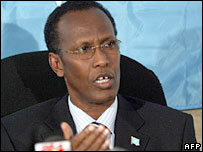BBC NEWS
Friday, September 29, 2006
 Prime Minister Ghedi’s government was set up after years of talks |
Ali Mohamed Ghedi’s government only controls a small area around the town of Baidoa, while the Union of Islamic Courts has taken most of the south.
Mr Ghedi denied that Ethiopian troops were in Baidoa but he told the BBC both countries’ forces were “on alert”.
The UIC has denied accusations that it is linked to al-Qaeda.
This week the group seized the key port of Kismayo, where it has closed down a local radio station and briefly detained three journalists, following three days of anti-Islamist protests.
Dialogue
“The security of Somalia is linked with the security of neighbouring countries,” Mr Ghedi told the BBC’s Network Africa programme.
“Ethiopian troops, as well as Kenyan troops, are on alert, if any external or internal forces try to attack the Transitional Federal Government and its temporary seat in Baidoa,” he said.
One of the Islamist leaders, Sheikh Hassan Dahir Aweys, is quoted by the London-based Al-Sharq al-Awsat newspaper as saying the group has no intention of attacking Baidoa.
However, he was also quoted as saying he would not tolerate the presence of Ethiopian troops there.
Mr Ghedi also said that the government was ready to hold peace talks with the UIC, if it wanted dialogue.
It is not clear whether peace talks scheduled for this weekend in Sudan are still taking place.
The UIC says it took Kismayo to prevent it being used to bring foreign peacekeepers into the country, as requested by the interim government.
Earlier this month, the African Union agreed to a request by Somalia’s transitional government to send in a regional peacekeeping force.
Mr Ghedi’s government was set up in 2004 after two years of peace talks in Kenya.
Somalia has not had an effective national government since 1991.
Source: BBC, Sept 29, 2006





